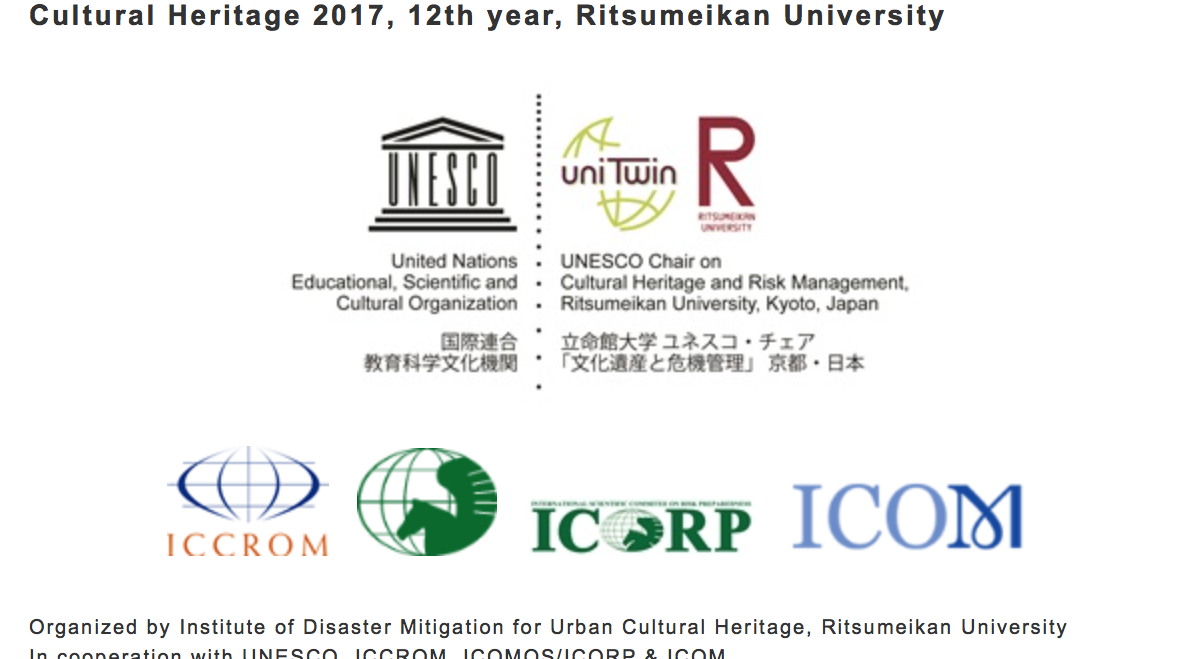-
-

- 2017-03-27 协会动态
协会理事长童明康率调研组赴江西调研考察申报世界文化遗产工作
3月20日至25日,国家文物局原副局长、中国古迹遗址保护协会理事长童明康率调研组赴江西调研考察申报世界文化遗产工作。江西省文化厅党组书记、厅长池红陪同考察调研。童明康在景德镇调研童明康一行先后来到景德镇御窑厂国家考古遗址公园、明清窑作群、湖田窑遗址,上饶婺源篁村及篁岭古村落、三清山,抚州金溪县浒湾书铺街、竹桥古村、文昌里历史文化街区等地进行实地调研。童明康在景德镇御窑厂国家考古遗址公园调研童明康强调,要加大对古遗址、古村落、古建筑的保护力度,以保护为基础、利用为导向,充分激发文物(遗址)的文化价值、社会价值和经济价值;要加大人才队伍培养,善于借鉴其他地区申遗成功经验,为申遗工作顺利推进创造条件;各地要认真总结经验,让古村落、古建筑焕发生机,打好文化牌。调研组在景德镇召开座谈会在景德镇,调研组召开座谈会,听取景德镇市委、市政府和基层文化工作者代表的工作汇报,详细了解景德镇市申遗工作成果。童明康肯定了景德镇市申遗工作成果,并就做好世界文化遗产申报、大遗址考古和文物保护等工作提出具体指导意见。童明康指出,要发掘和诠释遗产文化内涵,完善价值表达方式,讲好千年瓷都积淀的人文故事;要积极探索和创新非遗文化的再现与展示,将传统展示方法与数字化展示相结合,提升大众对非遗文化的认同感。童明康指出,婺源、三清山要着重加大对传统文化的研究和传承力度,让人们看得见山,望得见水,记得住乡愁。在抚州调研时,童明康指出要积极开展金溪村庄环境整治,改善村民居住环境,吸引更多的原住民返回村庄居住;要将文昌里历史文化街区改造与发扬临川文化有机地结合起来,打好“汤翁”牌,将文昌里打造成充分展示临川文化的“活的博物馆”。童明康在三清山三清宫古建筑群考察童明康还来到省博物馆参观了南昌汉代海昏侯国考古成果展,听取了南昌汉代海昏侯国遗址管理局关于海昏侯遗址申遗的规划报告,并对进一步加强文物保护利用、做好申遗工作提出了要求。童明康在抚州冒雨赴古村调研景德镇市委书记钟志生、市长梅亦,抚州市委书记肖毅,上饶市副市长郑少薇分别陪同调研。文字、图片:景德镇市文广新局、上饶市文广新局、抚州市文广新局 编辑:伍文珺(江西文化发布公众号)
-
-
- 2017-03-27 国际之声
ICCROM和CCI最新出版两本有关“文化遗产风险管理”工具书
In today’s world, cultural heritage institutions must strive to be accountable, transparent and participatory, spending resources effectively while balancing needs of the community with those of the future.A risk management approach will enable organizations to identify and manage risks to cultural assets, so they can make smarter decisions about their preservation, access and use.By investigating risk management in other fields such as health and finance, and thanks to over a decade of international training and case studies, ICCROM and CCI have developed and refined an innovative methodology now available for free downloadin twocomplementary publications:The ABC Method – A risk management approach to the preservation of cultural heritageA Guide to Risk Management of Cultural HeritageFor more information, please visit:http://www.iccrom.org/prioritizing-preservation-using-the-risk-management-approach/
-
-
-

- 2017-03-22 国际之声
2017ITC“灾难风险管理”主题培训班将于今年8月底在日本举办
Call for Application for UNESCO Chair Programme on Cultural Heritage and Risk Management, International Training Course (ITC) on Disaster Risk Management of Cultural Heritage 2017, 12th year1.Dates and PlacesDates of Course:28th August to 16th September, 2017Place: Kyoto, Kobe and Kumano, Japan2. Sub theme of ITC2017Towards Integrated Protection of Immovable and Movable Cultural Heritage from Disasters3. For more information, please visit: http://www.r-dmuch.jp/en/project/itc_2017.html4. Application deadline:April 5th (Wednesday), 2017
-
-
- 2017-03-09 协会动态
《世界文化遗产影响评估指南》中文版
各位会员:由国际古迹遗址理事会出版,中国古迹遗址保护协会翻译的《世界文化遗产影响评估指南》中文版现已问世。欢迎免费下载:《世界文化遗产影响评估指南》中国古迹遗址保护协会2017.3.9
-
-
- 2017-02-22 资质资格
资质查询系统现已上线
各位会员:文物保护工程资质查询系统现已上线,请点击网站首页导航中“资质查询”一栏进行查询。系统使用说明书下载地址请见:文物保护工程资质查询系统使用说明。如有疑问,请发送至zizhi@icomoschina.org.cn与我们联系,谢谢!中国古迹遗址保护协会2017年2月22日
-
-
- 2017-02-15 国际之声
关于征求《国际古迹遗址理事会和国际园林建筑师联合会关于乡村景观作为遗产的原则》草案意见的通知
各协会会员及相关专家:《国际古迹遗址理事会和国际园林建筑师联合会关于乡村景观作为遗产的原则》草案现已初成,协会邀请各位会员及专家针对草案文本积极讨论,发表意见和建议,谢谢!截止日期:2017年3月3日(周五)联系方式:请将意见或建议发送至协会邮箱,icomoschina@icomoschina.org.cn草案文本内容如下:国际古迹遗址理事会ADCOMSC 2016/5-1-1b版本号:23/09/2016第5-1-1b项议程《国际古迹遗址理事会和国际园林建筑师联合会关于乡村景观作为遗产的原则》草案:草案文本有待评论,以形成正式理论文本基本原理 在递交至国家委员会和国际科学委员会进行评论之前,先传阅至国际古迹遗址理事会科学委员会 达成一致意见,将修订后的《国际古迹遗址理事会和国际园林建筑师联合会关于乡村景观作为遗产的原则》草案提交至2017年国际古迹遗址理事会全体大会,作为国际古迹遗址理事会的正式理论文本。背景 世界乡村景观是国际古迹遗址理事会-国际园林建筑师联合会文化景观科学委员会(ISCCL)于2012年联合推出的倡议行动,目的是促进国际合作、加强对作为遗产的乡村景观的研究、管理和保护。 该行动旨在允许不同的机构和利益相关方:(1)共享经验和知识;(2)根据当地特色、传统知识和可持续使用状况,强化生产性乡村景观中重要的、延续下来的遗产,详见http://www.worldrurallandscapes.org; 下述决议由文化景观科学委员会(ISCCL)提议,已在第18届全体大会和科学研讨会上审议通过:欢迎国际古迹遗址理事会文化景观国际科学委员会(文化景观科学委员会(ISCCL)/国际古迹遗址理事会-国际园林建筑师联合会)联合推出的世界乡村景观倡议行动,这项全球行动有助于促进对世界乡村景观的保护和管理;强烈鼓励国际古迹遗址理事会国家及国际委员会参与到该行动中来,以形成世界乡村景观保存和管理的指导方针。 国际古迹遗址理事会2015年全体大会(日本;2015年10月)之后,文化景观科学委员会(ISCCL)花了10个月的时间来制定《国际古迹遗址理事会和国际园林建筑师联合会关于乡村景观作为遗产的原则》草案。 文化景观科学委员会(ISCCL)2016年度大会 (巴斯,英国;2016年9月7-9日)批准制定《国际古迹遗址理事会和国际园林建筑师联合会关于乡村景观作为遗产的原则》草案,并支持将该原则提交至国际古迹遗址理事会全体大会(德里,印度;2017年11月)形成正式理论文本。期望的成果在2017年全体大会上审议通过《国际古迹遗址理事会和国际园林建筑师联合会关于乡村景观作为遗产的原则》,成为正式理论文本。草案建议回顾了ADCOMSC 2014/11 5-3关于推进国际科学委员会间的合作以推动世界乡村景观行动的建议,以及18GA 2014/35号决议;已审查文化景观科学委员会(ISCCL)关于乡村景观作为遗产的原则草案;考虑了文化景观科学委员会(ISCCL)在世界乡村景观倡议行动中持续开展的工作;科学委员会: 同意将《国际古迹遗址理事会和国际园林建筑师联合会关于乡村景观作为遗产的原则》草案传阅至国家委员会和国际科学委员会,提出评论意见; 同意继续推进该原则,以便在国际古迹遗址理事会2017年全体大会上审议通过,形成国际古迹遗址理事会国际通用的正式理论文本; 同意将原则草案传阅至其他国际性文化组织和专家处(国际园林建筑师联合会、国际自然保护联盟、联合国粮食及农业组织等),征求相关意见。附件关于乡村景观作为遗产的原则草案(英语/法语版)国际古迹遗址理事会和国际园林建筑师联合会关于乡村景观作为遗产的原则序言乡村景观是人类遗产的重要组成部分,也是持续性文化景观最常见的类型之一。全世界有各种各样的乡村景观,它们代表了文化和文化传统。乡村景观是生产食物和其他可再生自然资源的场地,主要用于农业生产、畜牧业、渔业和水产业、野味食品的养殖和狩猎、食盐等其他资源的提取等。乡村景观既是一种承担多种功能的资源、也是一种文化景观。该文件鼓励人们进行深入思考,在广泛范围内,在国际及地方管理层面,为乡村景观体系的理论准则、文化、环境及可持续转化提供指导。认识到以文化为基础的食品生产及其对可再生自然资源的利用具有全球重要性,以及在当代文化、环境、经济、社会及法律背景下面临的问题和挑战;考虑到《联合国世界人权宣言(1948年)》、《联合国生物多样性公约(1992年)》、《联合国教科文组织世界文化多样性宣言(2001年)》、《联合国土著人民权利宣言(2007年)》、《粮食和农业植物遗传资源国际条约》(粮食和农业组织,2011年),2015年联合国可持续发展目标(尤其是但不限于子目标11.4[1])等国际公约均阐明,所有人类都有权享受充足的、健康的和有安全来源的食物和水;考虑到《古迹遗址保存和修复威尼斯宪章(1964年)》、《联合国教科文组织保护世界文化和自然遗产公约(1972年)》、《国际古迹遗址理事会-国际园林建筑师联合会历史公园佛罗伦萨宪章(1981年)》、《国际古迹遗址理事会历史城镇和城市地区保护华盛顿宪章(1987年)》、《国际古迹遗址理事会奈良真实性文件(1994年)》、《联合国教科文组织保护非物质文化遗产公约 (2003年)》、《国际古迹遗址理事会关于历史建筑、古遗址和历史地区周边环境保护的西安宣言(2005年)》、《联合国教科文组织关于历史城市景观的建议(2011年)》、《国际古迹遗址理事会关于作为人类价值的遗产与景观的佛罗伦萨宣言(2014年)》等国际文件都与遗产和景观的文化价值相关;考虑到地区及国家层面诸多文件都与乡村景观有关,如《欧洲景观公约(2000年)》、《欧洲乡村遗产监察指南(CEMAT,2003年)》、《欧洲委员会社会文化遗产价值法罗公约(2005年)》、《关于神圣自然遗址和文化景观在生物和文化多样性保护中的作用的东京宣言(2005年)》、《关于加勒比海文化景观的古巴圣地亚哥宣言(2005年)》、《拉丁美洲景观行动(LALI) (2012)年》、《国际古迹遗址理事会澳大利亚委员会关于保护具有文化意义地点的宪章(巴拉宪章)(1999-2013年)》、《国际园林建筑师联合会亚太地区景观宪章(2015年)》;考虑到联合国教科文组织世界遗产中心《实施保护世界文化与自然遗产公约操作指南》(2015年),自1992年以来就将乡村景观认定为“延续性文化景观”;考虑到《国际古迹遗址理事会-国际园林建筑师联合会文化景观科学委员会(ISCCL)乡村景观米兰宣言(2014年)》认为乡村景观是遗产;考虑到国际自然保护联盟在其管理体系中识别出第五类受保护景观和海景,并认识到人们与周围环境进行互动的方式维系了生物-文化多样性特征(包括农业生物多样性以及文化和精神价值等);考虑到联合国粮食及农业组织《全球重要农业文化遗产》项目旨在确认和保护引人注目的土地利用体系和景观,这些体系和景观具有遗产价值,具有丰富的全球重要农业生物多样性和知识体系,在社区与其环境之间相互适应的过程中不断演变发展,存在可持续发展的需求和意愿;考虑了其他与乡村景观相关的文件,如《耕地遗产巴埃萨宪章(2012年)》、《匈牙利托卡伊葡萄园文化景观世界遗产主题专家会议的建议(2001年)》以及其他关于将乡村景观作为遗产的主题专家会议;认识到保护乡村景观将为人类社会带来多种经济和社会效益、具有多功能性、支持文化和生态服务,以及保护过程中受到的威胁、风险和挑战日益增加;国际古迹遗址理事会和国际园林建筑师联合会承诺将扩大双方的合作,通过传播和使用下述原则来提升人们的理解、促进对乡村景观遗产的有效保护、可持续转化、传递和鉴赏,将乡村景观遗产作为人类社会和文化的一部分以及世界范围内一种重要的资源。本文件的原则旨在通过对乡村景观遗产价值的认知、保护和促进,寻求方法解决乡村景观及其相关社区所面临的损失和负面改变。目的是推动在经济、社会、文化及环境等方面实现适度平衡。原则I. 乡村景观的定义及其价值A. 定义乡村景观:就本文件而言,乡村景观指经人与自然之间的互动关系而共同形成的陆地及水生区域,其中产生了食物和/或原材料等可再生自然资源。同时,生活在这些乡村地区的人们和社区还给这些地区赋予了独特的文化意义。乡村景观是动态的、活着的体系,共包括两类地区,一类地区在传统方法、技术、累积的知识、文化习俗等影响下得以产生并进行管理,在另一类地区传统生产方式则得到了改变。乡村景观包括管理良好的地区、已退化或废弃但仍可再次利用或开垦还原的地区,如广阔的乡村空间、半城市化地区、以及建成区域内的小型空间等。乡村景观由地面、亚表土及资源、上空以及水域等构成。乡村景观遗产:指乡村地区的物质及非物质遗产。乡村景观遗产的物理特征包括生产性土地、结构形态、水、基础设施、植被、定居点、交通、贸易网等,以及更广阔的物理、文化、与环境间的关系及场景等。乡村景观遗产还包括相关的文化知识、传统、习俗、当地人类社区身份及归属感的表达、过去和现代人们和社区赋予景观的文化价值和含义。乡村景观由技术、科学及实践知识构成,这与人与自然之间的相互关系有关。乡村景观反映了社会结构及功能组织的状况,以及过去和现在景观的形成、使用和变革。乡村景观遗产包括文化、精神和自然属性,这是生物文化多样性得以不断延续的重要因素。乡村景观遗产存在于各种类型的乡村地区,不管是引人注目的还是普通的、传统的还是近期通过现代化活动改造而成的。这些乡村的景观遗产层次不同,类型多样,与不同的历史时期相关,如同羊皮纸一样,再现历史。B.重要性乡村景观历经数千年得以形成,代表了地球人类和环境历史、生活方式及遗产等重要内容。世界许多地区都为当地社区和土著人群提供了食物、可再生自然资源以及福利等。部分景观用于生产和/或收获动植物资源,包括可食用资源等,这反映出在广阔空间内人类与其他物种间的复杂关系。丰富多彩的农业文化、林业、畜牧业、渔业和水产业、野生动植物资源以及其他资源活动对未来人类适应全球生活并实行弹性调整起着至关重要的作用。部分遗产目录认识到了乡村景观的遗产价值,如联合国教科文组织的《作为“持续性文化景观”的全球遗产名录》。区域、国家及地区层面的遗产清单及受保护区域机制可能已识别出这些乡村景观的遗产价值,也可能未能认识到其中的价值。不管何种层次的遗产清单,都旨在帮助人们认识到乡村景观中存在的物质及非物质属性及其价值,这是第一步,也是必要的一步,由此来推动对这些地区的可持续保护,将其相关知识和文化意义传递给下一代。C. 威胁不断增加的人口数量和气候变化导致乡村景观变得非常脆弱,面临灭失和/或遗弃或巨变的风险。乡村景观受到的威胁反映出三种互相关联的变化类型:1. 人口和文化层面(人口增长,城市扩展,开发压力,传统习俗、技艺、当地知识及文化的丧失);2. 结构化层面(全球化、贸易及贸易关系的增长、经济增长或衰退、农业文化实践和技艺的强化、国内牧草地和驯化物种多样性的丧失);3. 环境层面(气候变化、人口和环境退化、如对土壤、植被和空气质量的影响、生物多样性及农业生物多样性的丧失)。D. 挑战遗产在认识、保护和促进乡村景观、生物的文化多样性及其重要价值上都有重要作用。遗产可促进乡村和城市居民、地方社区、政府、工业和组织的联合,推动对动态性质、威胁、危险、以及地区优势和潜力的管理,从而有助于维护乡村景观、增加乡村景观的适应性和弹性。保护乡村遗产的完整性和真实性,应确保在乡村景观内工作和生活的当地居民保持较好的生活水平和标准。与所有其他遗产一样,乡村遗产也是一种经济资源,应对其加以适当利用,为实现当地长期可持续发展提供重要支撑。E. 效益乡村景观是未来人类社会和世界环境发展的关键资源:它们提供了食物和原材料;它们代表了经济的、空间的、环境的、社会的、文化的、科学的、技术的以及娱乐的要素(在某些区域)。除了提供食物和原材料外,乡村景观还有助于土地保护(自然、环境、土壤、水文网络),有助于将乡村文化(技艺、环境知识、文化传统等)传递给下一代。如乡村景观与遗产价值充分结合,并提升遗产价值,则能创造独特的经济和旅游效益。在过去几十年里,环境和文化遗产越来越成为国际、跨学科的和学科间研究的对象。社区或当地开展的行动,利益相关方、乡村和城市居民与专家学者之间的合作,都有助于人们将乡村景观视为有价值的共享资源加以保护、认知和强化。许多国际、国内和当地公共行政机构已制定了立法或政策来支持这一概念。F.乡村景观的可持续性随着时间推移,许多乡村体系已被证明具有可持续性和灵活复原性。这些乡村体系有截然不同的多个方面,可为未来乡村活动管理提供参考,为保护和提高生物文化多样性提供支持,并有助于保障人们获得充足、高品质的食物和原材料的权利。由于景观会经历持续的、不可逆的以及在所难免的改造过程,为此,在制定乡村景观政策时,应将重点放在如何管理随时间推移所形成的那些能被人们接受的适度的改变,以及如何保护、尊重和提升遗产价值。II 行动A. 理解乡村景观及其遗产价值1. 认识到所有的乡村景观都具有重要的遗产价值,或者被评估为重要价值或者具有一般价值,这些遗产价值多种多样,规模各不相同,并具有自己独特的特征(形状、材质、用途和功能、时间期限、变化等)。2. 记录乡村景观的遗产价值,以此作为有效规划、决策制定和实施管理的基础。3. 形成关于乡村景观物理及文化特征的基础知识:当今乡村景观的现状;乡村景观的历史演变及物质和非物质遗产的表现;景观的历史特征、内在特性及当代社会文化性质;乡村景观体系内不同构成部分之间(天然和人造,物质和非物质)存在的历史联系和现在联系(空间关系、文化、社会、生产关系及功能联系);以及过去和当今所涉及的利益相关方。4. 制定不同层面的乡村景观(世界范围内的、地域内的、国家内的、地方上的)的清单目录。建立清单目录时,应综合利用当地、传统的和科学的知识体系,利用目前存在的、系统化的、可供专业人士和非专业人士使用的方法,以利于在国际层面及地方层面收集并比较有关乡村景观的资料信息。为建立有效的数据库,清单目录应考虑复杂性、人力成本、数据收集和整理时间安排等因素,并吸引专家学者和当地居民共同参与。5. 形成相关知识体系,促进对不同层面(世界范围内的、地域内的、国家内的、地方上的)乡村景观的比较,支持共享研究和合作,促进从地方到国际的合作,促进公共及私人利益相关方之间的合作。当地居民应积极参与到集体知识的创建中来。6. 推动不同机构、非政府组织和大学间展开广泛的、持续的合作,共同推进研究、信息共享、技术支持,在各管理层级合作开展知识创建活动。公众和当地居民也应积极参与。B.保护乡村景观及其遗产价值1. 审查并实施相关立法和政策框架,确保在利用和转化乡村景观时,在应对来自全球的、国内的及当地的威胁和风险时,保持生物文化的可持续性和灵活适应性。2. 制定法律、法规、经济战略、监管方法、信息共享和文化支持等政策方针,并加以实施。由于乡村景观具有较大的复杂性特征,为此必须形成详细的、跨领域的政策,从更广泛的层面考虑文化、社会、经济、环境等因素。3. 实施保护、修复、创新、适应性转化、维护和长期管理策略。由于乡村景观为延续性景观,开展遗产保护活动时必须努力促进全球管理方法与当地管理方法间的平衡,确保在设计和实施过程中所有利益相关方和社区都能参与和合作。4. 考虑到乡村景观的遗产价值包括经济、社会、环境、文化及空间等不同纬度,因此,对每一乡村景观的价值的良好认知,将有助于未来对遗产转化实现适当和有效的管理。5. 为制定有效的方针政策,需获取当地和其他方面有关景观的知识、了解其优势和缺点,以及潜在的威胁和机会。制定目标,选择适当的工具,形成项目行动计划,明确短期、中期和长期和管理目标。6. 为有效实施既定的方针政策,公众必须有足够的知识和意识,能够支持所需的战略方针,并积极参与进来。有必要与其他行动相互补充。公共管理机构应支持积极主动的和自下而上的行动。C. 持续管理乡村景观及其遗产价值1. 考虑到食物和自然资源生产的生态文化权利。应实施有规划的管理方法,认识到景观具有动态特征,是活生生的遗产,并尊重生活在其中的人类和非人类物种。尊重、重视并支持文化多样性以及不同民族采用的各种各样与自然相处的方法。2. 确认乡村景观的关键利益相关方,包括乡村居民、当地社区、土著群体和移民群体等,他们与所生活的地方有紧密的联系和附属性,创造了各种各样的与自然和环境状况相关的知识、历史和当下大事件、当地文化和传统、以及数世纪以来不断试验和实施的科学和技术方案。承认乡村居民高标准高质量的生活将有助于促进乡村活动的开展、维护乡村景观、将乡村实践和文化传递至下一代,源远流长。3. 考虑到在制定作为遗产的乡村景观资源可持续管理战略时,大规模和小规模景观在文化、自然、经济和社会等不同方面之间的关联。4. 考虑乡村景观和城市景观的相互联系。乡村景观是全球的大都市城市居民提升生活品质(休闲娱乐、食物的品质和数量、木柴、水和洁净的空气、食品种植等)的重要资源。城市可以为乡村景观出产的产品提供经济机会。应鼓励居住在乡村、城市边缘地区以及城市中的居民积极合作和实践,促进对乡村景观遗产知识的共享并承担管理职责。5. 实现长期可持续(经济,社会,文化,环境) 资源使用与遗产保护、乡村工人短期内提升生活品质的需求之间的平衡。这是维持和促进乡村景观活动的前提条件。生活品质包括收入、社会赞赏、教育等公共服务的供给、文化权利的认知等。这需要找到适当的方法和方式,使得社会改变和现代化与遗产价值的保护、利用和交流相一致,与乡村景观遗产的经济增效相一致。6. 支持对乡村景观实施公平治理,包括鼓励当地民众、利益相关方、城市及农村居民积极参与到乡村景观遗产的管理和监测中来,进行知识传递,肩负相关责任等。这是因为许多乡村景观包括私人、公司和政府等多种所有权形式,为此形成合作式工作关系是有必要的。D. 乡村景观遗产和价值的沟通及传递1. 可通过共享学习、教育、培训和研究活动等合作行动提升对乡村景观遗产价值的认知。制定沟通计划和实践方案,将民间团体、私营组织、公共管理机构等纳入进来,同时还吸引城市及乡村居民参与。2. 提升人们对相关方式方法的认识,促进传统知识和技艺的传播,开展相关案例研究,并推广最佳实践活动。3. 使用各种工具、方法和文化实践活动支持共享学习、培训和研究,如信息共享、教育、现场培训等,吸引当地社区、遗产专家、来自不同学科、学校和大学的专家学者等利益相关方以及媒体的积极参与。注:该文件由国际古迹遗址理事会-国际园林建筑师联合会文化景观国际科学委员会进行推广(世界乡村景观行动http://www.worldrurallandscapes.org/ )[1] “强化对世界自然遗产和文化遗产的保护和防护” (联合国议程 2030年)。
-
-
- 2017-02-10 会员动态
中国古迹遗址保护协会第三届理事会2017年第一次常务理事会在京召开
2017年2月10日,中国古迹遗址保护协会第三届理事会2017年第一次常务理事会在京召开。会议由理事长童明康主持。副理事长吕舟、陈同滨、陈星灿、侯卫东,财务总监朱晓东,秘书长陆琼,常务理事王军、王旭东、王毅、吴东风、黄滋参加会议。国家文物局文物保护与考古司副司长闫亚林、遗产处副处长邵军出席会议。会议讨论了关于召开协会第四次会员代表大会的有关事项,审议通过了会员代表大会召开时间、地点、议程、主要拟任负责人选、《章程》修订、会费标准的调整等草案。会议还审议了协会2016年度工作报告、财务报告和2017年的重点工作,并对会员的发展以及如何进一步扩大协会影响等问题进行了讨论。
-
-
-

- 2017-01-20 国际之声
“20世纪以来军事遗产”国际研讨会将于今年9月在挪威召开
MILITAGE Norway 2017ICOFORT International Conference on Military Heritage from the 20th Century4-7 September 2017Northern NorwayICOFORT,the ICOMOS International Scientific Committee on Fortifications and Military Heritage, organizes each year a meeting in collaboration with the local committee in the housing country. In 2017 the meeting will take place in Northern Norway, a region with a rich history in fortifications and military heritage especially from World War II occupation, Cold War period and traces of fifty years with military exercises by NATO forces. The theme of the conference MILITAGE 2017 will be «Military Heritage from the 20th Century».Northern Norway is known for dramatic scenery with mountains, fjords and arctic light. While attending the conference the participants will experience the landscape and become aware at the strategic military role this region has played – and still do – in a global perspective.The theme of the conference covers a broad range of topics/areas, including identification of values, conservation issues, management and ownership and challenges in reuse of military objects, case studies and guidelines.ICOFORT invites papers for MILITAGE Norway 2017.The extended deadline for the submission of abstracts is30 January 2017.For more information, pleasevisit:http://www.militage2017.icofort.org/#!section=16014691&cat=0
-
-
- 2017-01-05 会员动态
2016年12月加入协会会员名单
个人会员(7名)安徽省文物考古研究所:邓坚、吴强合肥市文源古建筑保护设计有限公司:洪涛、孙升、丁新腾、马延云、王悦
-
搜索SEARCH
CHINESE NATIONAL COMMITTEE FOR THE INTERNATIONAL
COUNCIL ON MONUMENTS AND SITES
COUNCIL ON MONUMENTS AND SITES

